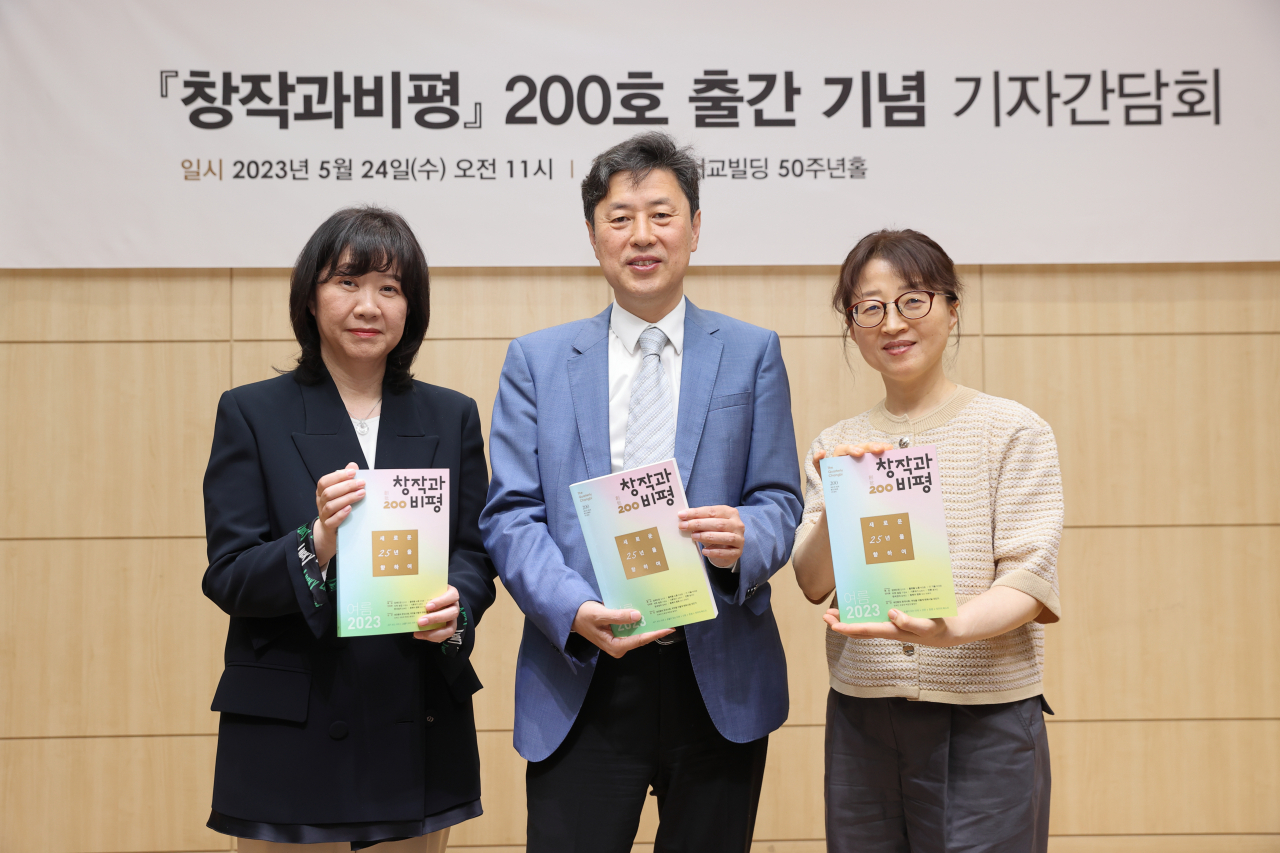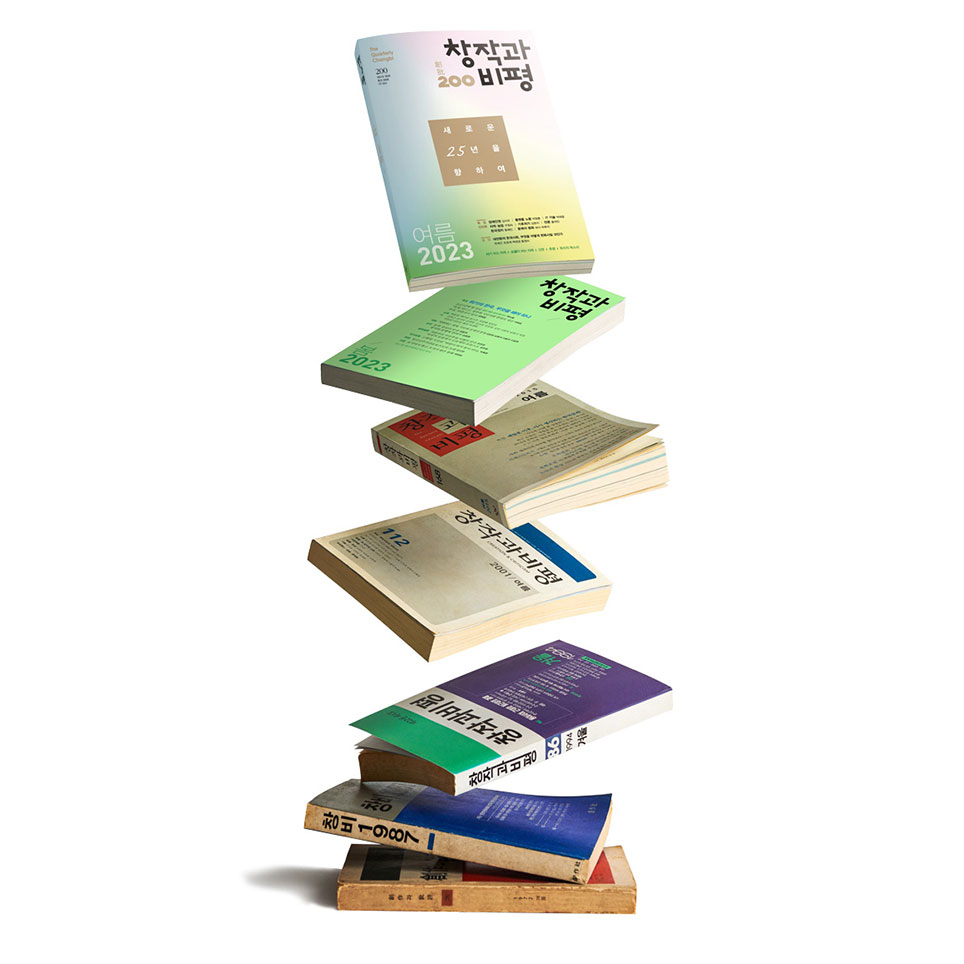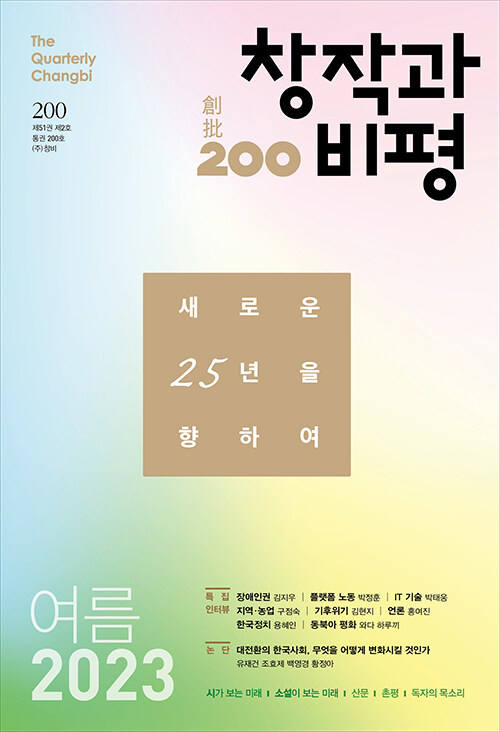 |
From left: Vice Editor-in-Chief Baik Ji-Yeon, Editor-in-Chief Lee Nam-Ju and Vice Editor-in-Chief Hwang Jung-a of the Quarterly Changbi pose for a group photo after a press conference at Mapo-gu, Seoul, May 24. (Changbi Publishers) |
Changbi Publishers, a leading publisher, marked a milestone with the release of the 200th issue of the Quarterly Changbi, its highly regarded quarterly magazine of literature, critique and discourse.
Lee Nam-ju, the editor-in-chief, summarized the magazine’s motto as “beopgochangsin” which can be translated as “to create something new by taking inspiration from the old.”
“We will continue to adhere to our original direction while adapting to the changes in the times -- being attentive to the demands of the era and the sensibilities of our readers,” said Lee at a press conference in Mapo-gu, Seoul, on May 24.
“We hope to explore ways to combine ideals and realities as we move forward steadfastly but anew,” he said.
 |
Covers of the the Quarterly Changbi (Changbi Publishers) |
It took 57 years for the Quarterly Changbi, founded in 1966, to reach its 200th issue in the summer of 2023.
The quarterly was forcibly shut down by the Chun Doo-hwan military junta in 1980. When Changbi Publishers reissued the journal in 1985, the company's publishing license was revoked. Following the June 1986 Democratization Movement, the publishing company issued an edition of the Quarterly Changbi. When Changbi Publishers was registered once again as a publisher in 1988, the Quarterly Changbi publication also resumed.
Since its reestablishment in 1988, the quarterly has maintained its position as one of few comprehensive literary magazines in the country, featuring both critical discourse and literature -- thus its title in Korean: Creation and Criticism.
Once a must-read in academic and intellectual circles, the Quarterly Changbi, however, encountered difficulties in keeping up with the rapidly changing times in the 1990s.
In an effort to keep abreast of the changing times, Changbi launched the magazine online and started operating online reading groups in 2019, and since 2022 has also been focusing on essays, a genre that appeals to young readers.
The magazine launched an essay section, "Where I live," last year. The 200th issue features the Korean Chinese writer Geum Hee's "Spring in Changchun."
"We are working with established writers and also focusing on discovering unique voices in the literary field, such as Geum Hee," added Vice Editor-in-Chief Baik Ji-Yeon.
 |
Cover of the 200th issue of the Quarterly Changbi (Changbi Publishers) |
“Reading habits have undergone considerable changes,” Lee said. “We are aware of the challenges the magazine is facing, but fortunately, our loyal readers have helped to create a solid foundation for publication.”
Changbi said it has maintained a circulation of 10,000 copies per issue, and the number of regular subscribers has been at 5,000 over the past 20 years.
The editorial team emphasized their commitment to maintaining the tradition of publishing in print, describing magazines as a “slow medium” that calls for a thoughtful and thorough discussion on overlooked or neglected aspects of society.
"A journal is, in a sense, a slow medium,” said Vice Editor-in-Chief Hwang Jung-a. “It is also necessary to take a break and step back, and delve into issues more deeply and carefully.”
In its 200th issue in a series of interviews under the theme “Towards the New 25 Years,” the magazine looks into eight critical issues, including disability rights, climate change, Korean politics and the media.
English and Chinese translations of the editorials are available on Changbi’s official website. The site also provides English-language abstracts for each article. Major articles are available online in Japanese as well.







![[Today’s K-pop] Blackpink’s Jennie, Lisa invited to Coachella as solo acts](http://res.heraldm.com/phpwas/restmb_idxmake.php?idx=644&simg=/content/image/2024/11/21/20241121050099_0.jpg)